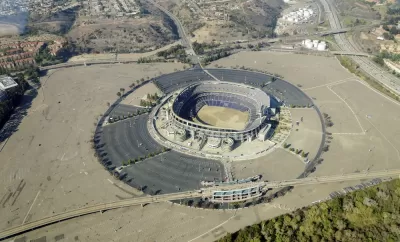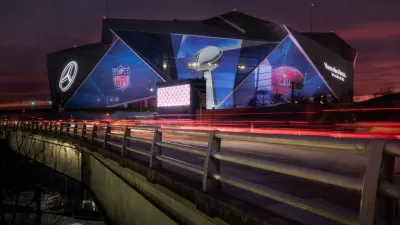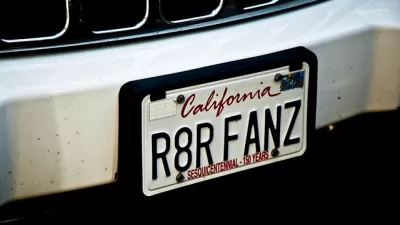The San Diego Chapter of the American Institute of Architecture believes the NFL Chargers’ downtown stadium proposal is full of risk and lost opportunities. AIA - SD opines the existing stadium site is superior both for the fan and the taxpayer.

In an op-ed, the San Diego Chapter of the American Institute of Architects asks San Diegans to look past the glossy images and the media blitz of the NFL Chargers in their effort to secure a new downtown stadium. Earlier in the year, the Chargers ownership rejected a proposal by the City to build them a new $1.2 billion stadium near their existing stadium site. Instead, Chargers’ owner Dean Spanos sought what he believed was a greener pasture in Los Angeles via a joint stadium proposal with the Oakland Raiders on a former landfill in Carson. However, the NFL owners chose a competing proposal by St. Louis Rams owner Stan Kroenke to build a stadium in Inglewood. As a consolation prize, Spanos was given $300 million and the option of becoming a tenant in Kroenke’s new stadium. He has a year to make the decision. Spanos is using the time to push for a new stadium in San Diego's downtown. The Chargers proposal, via ballot initiative, is to build a combination stadium/convention center annex a la Indianapolis’s Lucas Oil Stadium. Public funding will come via a hefty increase to the Transient Occupancy Tax on hotel rooms. Spanos is selling the tax increase as essentially a windfall paid by out-of-towners.
The AIA - SD points out the many costs and unknown risks of the downtown stadium proposal in comparison to building at the existing Mission Valley site. Such costs and risks include the lack of existing road, parking, and transit infrastructure at the new site, the lack of identified funding for such infrastructure, the potential displacement of the current development “renaissance” near the site, the impact of traffic on surrounding communities, the high potential for cost overruns and delays due to environmental and other issues, the lack of sufficient space (15 acres) at the downtown site for a stadium (nevermind a combination stadium/convention center), the convention industry’s preference for expanding the existing convention center rather than building a convention annex attached to a stadium, the potential liability of the city for cost overruns falling outside the scope of Charger's portion of the project, and perhaps most importantly, the existence of a better alternative at the existing Mission Valley stadium site, which eliminates many of these concerns.
To read the op-ed itself, please visit the original article.
FULL STORY: A Football Stadium in East Village? Not so Fast

Planetizen Federal Action Tracker
A weekly monitor of how Trump’s orders and actions are impacting planners and planning in America.

Map: Where Senate Republicans Want to Sell Your Public Lands
For public land advocates, the Senate Republicans’ proposal to sell millions of acres of public land in the West is “the biggest fight of their careers.”

Restaurant Patios Were a Pandemic Win — Why Were They so Hard to Keep?
Social distancing requirements and changes in travel patterns prompted cities to pilot new uses for street and sidewalk space. Then it got complicated.

Platform Pilsner: Vancouver Transit Agency Releases... a Beer?
TransLink will receive a portion of every sale of the four-pack.

Toronto Weighs Cheaper Transit, Parking Hikes for Major Events
Special event rates would take effect during large festivals, sports games and concerts to ‘discourage driving, manage congestion and free up space for transit.”

Berlin to Consider Car-Free Zone Larger Than Manhattan
The area bound by the 22-mile Ringbahn would still allow 12 uses of a private automobile per year per person, and several other exemptions.
Urban Design for Planners 1: Software Tools
This six-course series explores essential urban design concepts using open source software and equips planners with the tools they need to participate fully in the urban design process.
Planning for Universal Design
Learn the tools for implementing Universal Design in planning regulations.
Heyer Gruel & Associates PA
JM Goldson LLC
Custer County Colorado
City of Camden Redevelopment Agency
City of Astoria
Transportation Research & Education Center (TREC) at Portland State University
Camden Redevelopment Agency
City of Claremont
Municipality of Princeton (NJ)





























